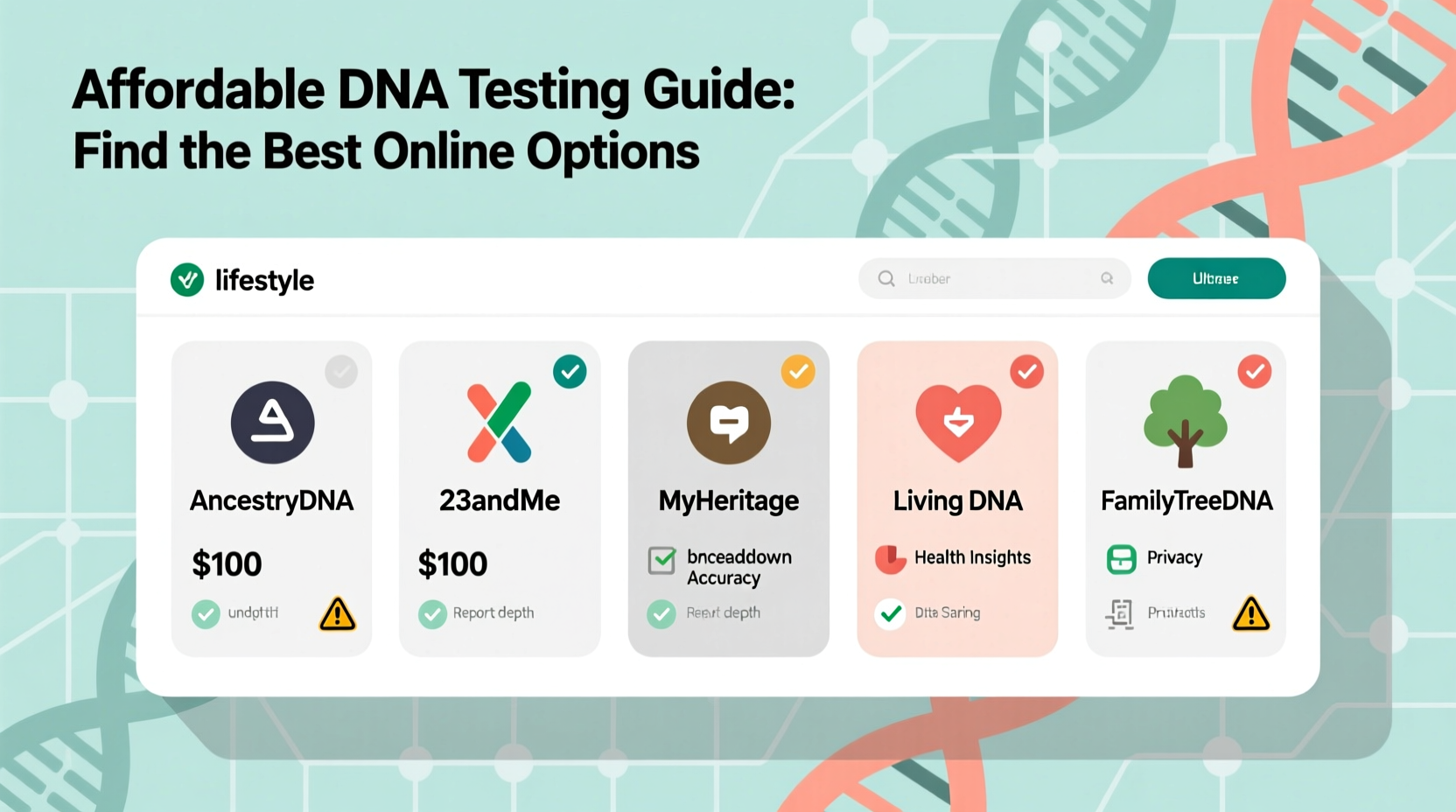DNA testing has transitioned from a luxury reserved for crime labs and medical research to an accessible tool for everyday consumers. Whether you're curious about your ancestry, seeking health insights, or exploring genetic traits, dozens of companies now offer at-home kits that deliver detailed reports—often for under $100. But with so many options, how do you choose one that’s both affordable and trustworthy?
This guide cuts through the marketing noise to help you identify the best DNA testing services based on cost, accuracy, data privacy, and real-world utility. From budget-friendly picks to premium features worth considering, you’ll learn how to make an informed decision without overspending.
Understanding Your Testing Goals

Before selecting a DNA test, clarify what you hope to gain. Different tests serve different purposes, and choosing the wrong type can lead to wasted money and misleading results.
- Ancestry Testing: Traces your ethnic background and geographic origins using autosomal DNA.
- Health & Wellness Testing: Screens for genetic predispositions to certain conditions (e.g., BRCA mutations), carrier status, and wellness traits like lactose intolerance.
- Paternity or Family Matching: Confirms biological relationships, often used in genealogical research or legal cases.
- Trait Analysis: Reveals fun or informative details like eye color probability, muscle composition, or taste sensitivity.
Most affordable kits focus on ancestry and basic trait reporting. If you want comprehensive health data, expect to pay more or opt for a service that partners with certified laboratories.
Top Affordable DNA Testing Options Compared
The following table compares leading DNA testing services based on price, key features, and value for budget-conscious users.
| Service | Price (Kit Only) | Ancestry Report | Health Insights | Data Privacy Policy | Additional Notes |
|---|---|---|---|---|---|
| AncestryDNA | $59–$79 | Yes – 1,000+ regions | No | Opt-in for research; can be withdrawn | Largest user database for family matching |
| 23andMe (Ancestry + Health) | $99–$129 | Yes – 1,500+ regions | Yes – FDA-approved reports | Strong encryption; limited sharing unless consented | Balanced option for health + ancestry |
| MyHeritage DNA | $49–$69 | Yes – 42 ethnicities | No (upgrade available) | GDPR-compliant; strict access controls | Frequent sales; popular in Europe |
| FamilyTreeDNA (Autosomal) | $79 | Yes – 38 global regions | No | Ownership of data retained by user | Good for serious genealogists |
| Living DNA | $89 | Yes – UK-focused detail | Basic wellness traits only | Non-commercial research opt-in | Best for British Isles ancestry |
While AncestryDNA and MyHeritage lead in affordability and user base size, 23andMe stands out for combining health and ancestry in a single, reasonably priced package. Always check for seasonal discounts—Black Friday and holiday periods often bring prices down by 30–50%.
How to Maximize Value Without Sacrificing Accuracy
A low price shouldn’t mean low quality. Follow these steps to ensure you get accurate, useful results even on a tight budget.
- Verify Lab Certification: Confirm the company uses CLIA- and CAP-certified labs. These accreditations ensure high standards for processing and analysis.
- Check SNP Coverage: Look for tests analyzing at least 600,000 SNPs (single nucleotide polymorphisms). More markers generally mean higher resolution.
- Download Raw Data: Most services let you export your genetic file. Use it with free tools like Promethease or Genetic Genie for additional health insights at no extra cost.
- Avoid Subscription Traps: Some companies charge monthly fees to access updated reports. Stick to one-time purchase models when possible.
- Compare Database Sizes: Larger databases improve relative matching. Ancestry boasts over 23 million users, making it easier to find distant cousins.
“Consumers should treat DNA tests like any medical information—choose transparency over price alone.” — Dr. Rebecca Liu, Genetic Counselor at Stanford Medicine
Step-by-Step Guide to Choosing and Using a Kit
Navigating the process from selection to results doesn’t have to be complicated. Follow this timeline for a smooth experience.
- Week 1: Define Your Goals
Decide whether you prioritize ancestry, health, or both. This narrows your choices significantly. - Week 1: Research & Compare
Use comparison sites and independent reviews. Avoid relying solely on brand websites. - Week 2: Purchase During a Sale
Wait for promotions. MyHeritage and Ancestry frequently drop prices during holidays. - Week 3: Collect Sample
Most kits use saliva collected via tube. Follow instructions carefully—insufficient samples are the top reason for delays. - Week 4–6: Lab Processing
Turnaround time varies. Ancestry averages 6–8 weeks; 23andMe may take slightly longer if health reports are included. - Week 7: Review Results
Explore ethnicity estimates, match lists, and health reports. Bookmark sections you want to revisit. - Ongoing: Protect Your Data
Adjust privacy settings. Consider deleting your account after downloading data if long-term storage concerns you.
Real Example: Sarah’s Experience with Budget Genealogy
Sarah, a 34-year-old teacher from Ohio, wanted to trace her roots after hearing family stories about Irish and Norwegian heritage. She didn’t need health data but hoped to connect with relatives.
She chose MyHeritage DNA during a $49 flash sale. After receiving her kit, she mailed the sample and waited seven weeks for results. Her report showed 38% Irish, 22% Scandinavian, and smaller traces from Eastern Europe—surprising, given her family narrative.
Better yet, MyHeritage matched her with three second cousins in Norway. Through messaging, she learned her great-grandfather had emigrated from Bergen in 1912—a fact lost to oral history. “For less than fifty bucks,” she said, “I found a missing piece of my identity.”
Privacy and Ethical Considerations
Your DNA is among the most personal data you own. While convenience is tempting, consider how companies handle your information.
- Does the company sell anonymized data to pharmaceutical firms? (Ancestry and 23andMe do, with opt-in consent.)
- Can law enforcement access your profile? (Some services comply with court orders.)
- Is your data encrypted both in transit and at rest?
If privacy is a top concern, consider services like Living DNA or FamilyTreeDNA, which emphasize user control. Alternatively, delete your raw data from company servers once downloaded—though matches may become inaccessible.
Frequently Asked Questions
Are cheap DNA tests accurate?
Yes, most reputable budget tests are highly accurate for ancestry and trait reporting. They use the same genotyping technology as pricier labs. However, ethnicity estimates are predictions—not definitive records—and can vary between companies due to reference population differences.
Can I switch services after testing?
You can upload your raw DNA data from one provider to another. For example, Ancestry customers can transfer data to MyHeritage or GEDmatch for free. This expands your match pool without buying multiple kits.
What happens to my DNA sample after testing?
Policies vary. Some companies destroy samples after analysis; others store them indefinitely unless you request disposal. Check each provider’s policy before ordering.
Conclusion: Make Smart Choices Without Breaking the Bank
Finding the best DNA testing option online doesn’t require spending hundreds of dollars. With clear goals, careful research, and attention to privacy, you can uncover meaningful insights into your heritage and health for under $80. The key is balancing affordability with reliability—choosing services that offer transparency, strong science, and user control.









 浙公网安备
33010002000092号
浙公网安备
33010002000092号 浙B2-20120091-4
浙B2-20120091-4
Comments
No comments yet. Why don't you start the discussion?